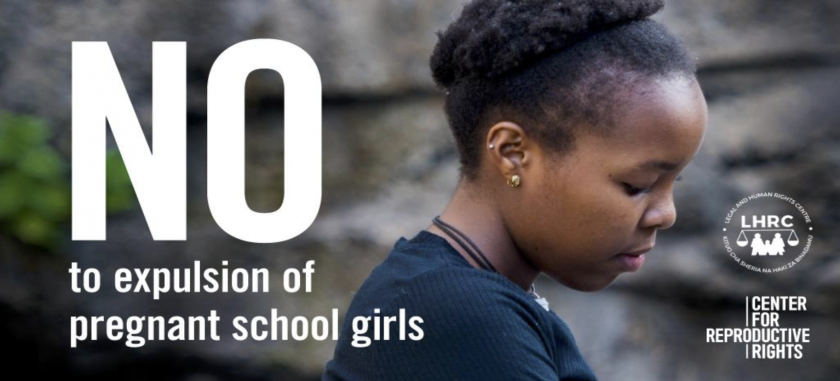
Center for Reproductive Rights and the Legal and Human Rights Centre file a complaint challenging the expulsion and exclusion of pregnant school girls in Tanzania
June 17, 2019
Dar es Salaam
Today, the Center for Reproductive Rights and the Legal and Human Rights Centre (LHRC) filed a Complaint before the African Committee of Experts on the Rights and Welfare of the Child challenging the expulsion and exclusion of pregnant girls from public schools in Tanzania. The Complaint was filed on behalf of female students in Tanzania and alleges violations of the African Charter on the Rights and Welfare of the Child and other international and regional human rights instruments ratified by the country.
“Forcing girls to undergo pregnancy tests against their will, expelling them from schools if found to be pregnant, and denying re-entry after childbirth infringes on their right to education and equality and non-discrimination,” said Evelyne Opondo, Senior Regional Director for Africa at the Center for Reproductive Rights.
Tanzania has a long history of implementing discriminatory practices against pregnant schoolgirls. In June 2017, Tanzania’s President John Magufuli sparked outrage from local and regional human rights groups by declaring that students who become pregnant should not be allowed to finish their studies after giving birth.
“While both boy and girl students may face interruptions to their schooling, girls disproportionately bear the harshest consequences under the Tanzanian law. Pregnant school girls have a right to education and should be supported to stay in schools” said Fulgence Massawe, Director of Advocacy and Reforms at the Legal and Human Rights Centre.
Yesterday (On June 16, 2019) on the Day of the African Child, the world reflected on the unique challenges that children
face throughout the continent. Today, we take action to hold the Tanzanian government accountable for violating the rights of adolescent girls and the continual rise of teen pregnancies in Tanzania. The 2015-2016 Tanzania Demographic and Health Survey found that one in four women aged 15 to 19 are mothers. Schools often lack comprehensive sexuality education, with students reporting that they do not have the information they need to prevent pregnancy. Many of these girls became pregnant as a result of rape. Currently, there is no national sexuality education curriculum in mainland Tanzania.
On September 2012, Legal and Human Rights Centre, together with the National Organisation for Legal Assistance, filed a petition in the High Court of Tanzania against the Minister of Education and Vocational Training and the Attorney General of Tanzania on behalf of school girls in Tanzania, alleging that forced pregnancy testing in schools and the enforcement of the provisions of the 2002 Education (Expulsion and Exclusion of Pupils from Schools) Regulation, as far it is used to expel pregnant students from school, violated the provisions of the Constitution of Tanzania, in particular, Article 13 of the Constitution which guarantees the right to equality and non-discrimination. In August 2017, nearly five years after the petitioners first filed the case, the High Court dismissed the petitioners’ case on all counts.
In 2013, the Center for Reproductive Rights released Forced Out: Mandatory Pregnancy Testing and the Expulsion of Pregnant Students in Tanzanian Schools, a publication which documented that school officials in Tanzania were mandatorily expelling pregnant girls from schools. The same publication pointed out that annually, an estimated 8,000 female students dropped out of school due to pregnancy. Mandatory pregnancy testing is a serious infringement of girls’ rights to privacy and autonomy.
For press inquiries, please contact:
Center for Reproductive Rights: Veronika Cernadas at vcernadas@reprorights.org or Mburugu Gikunda at mburugug@gmail.com
Legal and Human Rights Center: Michael Mallya, mallya@humanrights.or.tz
